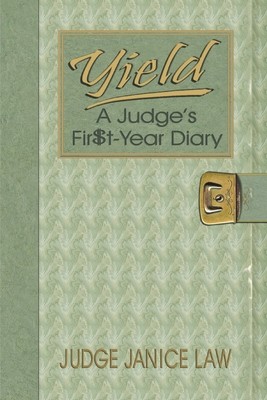| Yield: A Judge's Fir$t-Year Diary: A Judge's Fir$t-Year Diary Contributor(s): Law, Janice (Author) |
|
 |
ISBN: 1733942149 ISBN-13: 9781733942140 Publisher: Judgejanicelaw OUR PRICE: $20.66 Product Type: Paperback - Other Formats Published: July 2020 |
| Additional Information |
| BISAC Categories: - Biography & Autobiography | Lawyers & Judges - Law - History |
| Dewey: B |
| Physical Information: 0.69" H x 5.98" W x 9.02" (0.97 lbs) 328 pages |
| Descriptions, Reviews, Etc. |
| Publisher Description: What is it like to be a judge? At nearly every event I attend, people ask me that. My short answer is: Great or It's fine What it is like to be a judge is much too complex to be answered in any brief manner. Shortly after I was elected as judge in Harris County, (Houston, Texas) Criminal Court No. 5, I attended New Judges' School in Dallas with other newly elected judicial colleagues from all over Texas. One December evening, our instructors dis-cussed selecting one or more of us to keep a diary about our first-year experiences on the bench in upcoming 1999. Although I wasn't selected to keep a diary to read to new Texas judges in a future year, the suggestion gave me the idea for this book. I kept such a daily diary: detailed, meticulous, contemporaneous, unfailing. There is something voyeuristic about reading someone else's diary, verbal eavesdropping-forbidden fruit. Reaching in the closed drawer for the book when the author is absent, surreptitiously reading the very personal entries. My other inspiration for Yield was best-selling author Scott Turow's first book, One L, based on a journal Turow secretly kept during his first year as a student at Harvard Law School. In 1970, The Making of a Surgeon, a diary-like book by Dr. William A. Nolen, made a popular literary splash as the memoir of an apprentice physician. "In baseball it's the rookie year. In the navy it is boot camp. In many walks of life there is a similar time of trial and initiation, a period where newcomers are forced to be the victims of their own ineptness and when they must somehow master the basic skills of the profession in order to survive," Turow writes in his preface to One L. In my writing effort, I had at least two advantages most judges don't have: I worked as a print journalist for about 14 years before becoming an attorney and judge. (See "About the Author" at the end of Yield.) And I had served for about three years as a part-time associate judge in Houston's busy municipal court-not the same as full-time county criminal court, but helpful as background. |